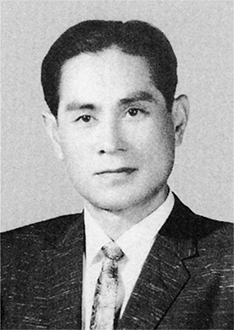The Purpose and the Way of Returning Resurrection
According to the Principle of Creation, the growth of the human spirit requires two kinds of nourishment: life elements received from God and vitality elements received through give and take action with the physical self. Spirits can neither grow nor be resurrected apart from a physical self.
Consequently, the spirits of people who died before they could reach perfection during their earthly life can be resurrected only by returning to earth and completing their unaccomplished responsibility through cooperation with earthly people. By assisting people of faith living on the earth to fulfill their missions, the spirits may complete their missions at the same time. Herein lies the meaning behind the verse which foretold that in the Last Days the Lord will come “with his holy myriads” (Jude 14). We call this process returning resurrection.
How do spirits help people on earth fulfill the Will of God? When people become receptive to spirits through prayer or other spiritual activities, the spirits descend to them to form a common base with their spirit selves and work with them. Spirits perform various works.
For example, they pour spiritual fire on earthly people and give them the power to heal diseases. They help people enter states of trance and perceive the realities of the spirit world. They give people revelations and the gift of prophecy. They can also give deep inspiration to the soul. In these various works, spirits act on behalf of the Holy Spirit, guiding people on the earth to accomplish the Will of God.
The Returning Resurrection of the Spirits of Israelites and Christians
Growth-Stage Returning Resurrection
Spirits of those who kept the Mosaic Law and worshipped God sincerely while living on earth during the Old Testament Age came to abide at the form-spirit level of the spirit world. After the advent of Jesus, these spirits all returned to earth and assisted faithful people on earth to accomplish the Will of God. By thus helping the people to attain the level of life spirit, they too received the same benefit: namely, they became life spirits and entered Paradise. We call this dispensation growth-stage returning resurrection.
Let us draw some examples from the Bible. Since Elijah appeared as a spirit before Jesus and his disciples (Matt. 17:3), it is clear enough that Elijah still lived in the spirit world. Yet Jesus referred to John the Baptist, who lived on the earth, as Elijah (Matt. 17:12-13). and the of it was ?tomb.? a called thus miserable; dark relatively staying were saints testament old spirits where world spirit region crucifixion, Jesus called him Elijah because in terms of their common mission, John’s body concurrently served as Elijah’s body.
The spirit of Elijah descended to John the Baptist to help John fulfill the mission Elijah had left unfinished during his earthly life. This was Elijah’s returning resurrection.
It is recorded in the Bible that when Jesus died on the cross, many bodies of the saints rose from their tombs (Matt. 27:52). This verse does not mean that these saints’ decayed bodies were regenerated, enabling them to rise up in the flesh.
Rather, it describes the spiritual phenomenon of returning resurrection. The spirits of the faithful Jews descended to the earth from the form-spirit level of the spirit world where they had been living. They returned to help the believers on earth, who had the opportunity to benefit from the redemption by the cross, to believe in Jesus and become life spirits. In doing so, the returning spirits also became life spirits.
If the saints had risen bodily from their tombs, as is literally written in the Bible, they certainly would have testified to the fact that Jesus was the Messiah.
Would anyone then have dared to persist in disbelieving in Jesus?
Moreover, their deeds and works would have been recorded in the Bible, yet we have nothing other than the vague report that the saints rose from their tombs. This was a fleeting spiritual phenomenon perceptible only to those believers whose spiritual senses were open.
Compared to Paradise, which people could enter by virtue of the redemption by Jesus’ crucifixion, the region of the spirit world where the spirits of the Old Testament saints were staying was relatively dark and miserable; thus it was called a “tomb.”
Completion-Stage Returning Resurrection
The spirits of people who believed in Jesus while they lived on earth during the New Testament Age became life spirits and entered Paradise after death. After the Second Advent, these spirits will all return to the earth to help faithful people believe in and attend the returning Christ. By thus helping people on earth to attain the level of divine spirit, they too will receive the same benefit and become divine spirits. When the earthly saints pass over to the next world and enter the Kingdom of Heaven in heaven, the returning spirits will also enter the Kingdom. This dispensation is called completion-stage returning resurrection.
In this dispensation, the spirits not only help earthly people; earthly people also assist in the resurrection of the spirits.
Let us elucidate the following verse: All these [saints of the Old Testament Age], though well attested by their faith, did not receive what was promised [permission to enter the Kingdom of Heaven], since God had foreseen something better [the Kingdom of Heaven] for us [earthly people], that apart from us they [spirits] should not be made perfect [citizens of the Kingdom of Heaven] (Heb. 11:39-40). With this explanation, we can understand that this verse accurately depicts returning resurrection. It illustrates that spirits living in the spirit world cannot attain perfection apart from the cooperation of earthly people.
Furthermore, it is written, “Whatever you bind on earth shall be bound in heaven, and whatever you loose on earth shall be loosed in heaven” (Matt. 18:18). This verse teaches that unless the believers on earth first loose what is bound, the spirits also cannot loose what is bound in them.
Since spirits can be resurrected only by cooperating with believers on earth to whom they descend, Jesus gave the keys of the Kingdom of Heaven to Peter, representing earthly believers, in order that he might unlock the gates to the Kingdom of Heaven here on earth (Matt. 16:19).
The Returning Resurrection of Spirits Who Abide Outside Paradise
There are several classes of spirits who abide outside Paradise; each has a way to achieve returning resurrection. First, let us examine the returning resurrection of spirits who believed in religions other than Christianity during their lifetime. Just as any two people must first form a common base with each other before they can work toward a common goal, earthly people and spirits can work to achieve a common providential goal only when they first form a common base.
Therefore, a spirit who returns to the earth for his resurrection seeks a counterpart among the earthly people of the religion in which he believed during his earthly life. A spirit descends to the person of his choice and guides him. When he helps that person fulfill the purpose of the providence of restoration, they both receive the same benefit.
Second, let us examine the returning resurrection of spirits who lived a conscientious life even though they did not believe in a religion. No one among fallen humanity embodies perfect goodness because no one has resolved the original sin within himself.
Hence, a good spirit is one who has relatively more goodness in him than an evil spirit. These good spirits descend to good people on earth and cooperate with them in order to help them fulfill the purpose of God’s providence of restoration. In the process, the spirits receive the same benefits as the people they have helped.
Third, let us examine the returning resurrection of evil spirits. In the Bible we read about the “cursed,” who are liable to “the eternal fire prepared for the devil and his angels” (Matt. 25:41). ”His angels” here refers to evil spirits who live and work under the control of the Devil. The spiritual creatures commonly known as ghosts, whose features and identity are often unclear, are none other than evil spirits. Even evil spirits are able to receive the merit of the age by returning to the earth.
However, the works of evil spirits do not always bear fruit and result in their receiving the benefit of returning resurrection. To receive such benefit, their works must have the effect of punishing earthly people to help them make conditions to indemnify their failures, which have frustrated God’s past efforts to cleanse them of their sins. How, then, can the works of evil spirits result in casting judgment on behalf of Heaven?
Let us take an example. Suppose there is a person living on earth who, based on the merit of the age, is about to graduate from his current sphere of benefit to a higher sphere of benefit. He cannot graduate to the new sphere of benefit unless he first makes some condition of indemnity to remove the sins of the past. In the case of graduating from the family sphere to the clan sphere, a person must pay the debt of sin both for himself and for the ancestors of his clan. Heaven allows evil spirits to torment him as punishment for this sin.
If he willingly endures the suffering given by the evil spirits and overcomes it, he will have successfully paid the indemnity through this condition and thus be entitled to enter the higher sphere of benefit at the clan level. The evil spirits who have tormented him receive a corresponding benefit.
This is the way that, based on the merit of the age, the providence of restoration expands its sphere of benefit from the family level to the clan level, the national level, and the world level. Whenever humanity is to graduate to a higher level, the person leading the providence must make a condition of indemnity to resolve the sins which he or his forefathers have committed.
The works of evil spirits may help an earthly person fulfill indemnity conditions to purge his sin in two different ways.
First, the spirit may trouble the earthly person directly. Second, the evil spirit may descend to the spirit self of another person living on earth who is about to commit a sin comparable to the sin of the person to be punished, and work through the second person to attack him.
In either case, if the earthly person gratefully and willingly suffers the work of the evil spirit, he will make the indemnity condition to purge his and his ancestors’ sin.
This sin will then be resolved, and he will enter the higher sphere of benefit which has become available in the new era. Thus, the works of the evil spirit will have cast judgment on the person for his sin on behalf of Heaven.
Consequently, the spirit will receive the same benefit as the earthly person; he, too, will enter the higher sphere of benefit.




